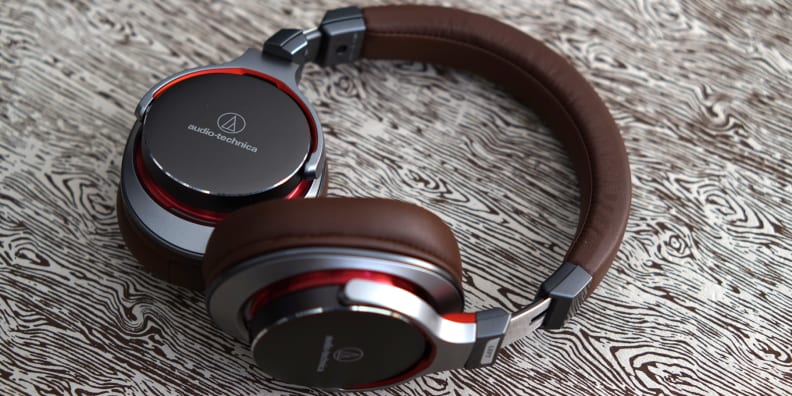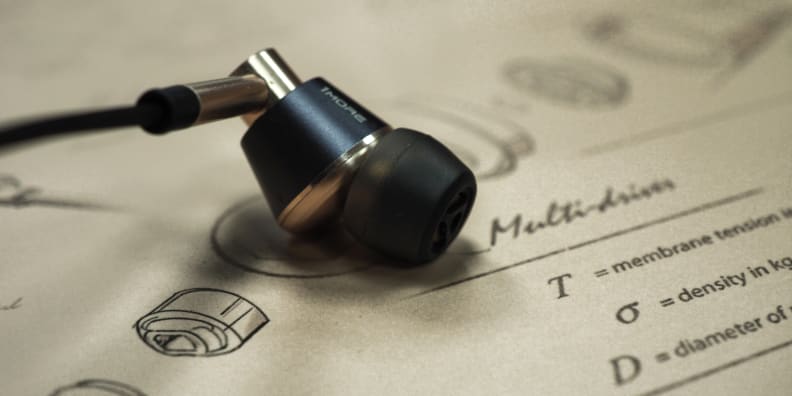What kind of headphones should you buy?
Over-ear, wireless, ear buds—what's right for you?
Products are chosen independently by our editors. Purchases made through our links may earn us a commission.
Here at Reviewed, we have a lot of respect for the unsung heroes of your household—your fridge, your dishwasher, even your bed sheets. But does anything really compare to your headphones?
Maybe you use headphones during your commute, while you workout, or for listening deeply in your favorite comfy chair at home. As they've evolved, headphones have grown to meet more and more daily use cases, to the degree that a comfy set for high-fidelity listening is a vastly different animal than portable workout buds. These days, investing in the right pair of headphones is all about knowing what you want to use them for.
So, what's the right pair of headphones for you, and which kind should you buy? Here's a basic overview of the different types of headphones on the market, their pros and cons, and some of our favorite picks.
Over-ear Headphones

This may be different for you, but when I think about the "default" headphones, I think about over-ear headphones. Ever since I bought my candy apple red Skullcandy over-ear headphones to listen to CDs on the school bus, I've loved over-ear headphones. They just provide a sense of isolation, comfort, and overall quality while listening.
They're not great for walking/running around in—even the wireless versions tend to be heavier, and those plushy pads trap a lot of heat. But over-ears' larger cups often provide for better sound quality compared to similarly-priced on-ear and in-ear/earbud style headphones.
One big element in over ears' favor: many modern over-ear headphones are almost completely repairable if they break down. Cup pads can be replaced, cords tend to be detachable (for wired models), and even the drivers inside are often replaceable giving your purchase a much longer shelf-life compared to in-ear models reliant on glued-in rechargeable batteries.
Pros:
- Comfort
- Isolation
- Bass
Cons:
- Not portable
- More prone to wear and tear
- Can be heavy/tiring
What does Reviewed recommend?
We test and review a lot of headphones, and literally every editor and writer on staff has at least one pair of super-favorite, beloved headphones, if not some kind of all out nerdy brand loyalty. When it comes to over-ears, there are tons of variations across the wired/wireless/Bluetooth/noise canceling spectrum, but these are our favorites:
• If you just want excellent all-around wired over-ear headphones, check out the Audio Technica ATH-M50X. After Apple's Airpods, these are the headphones I see most often. I've also used them for years, and if you can find them around $150, that's a steal.
• If you're looking for wireless/Bluetooth over-ears we love the Audio-Technica ATH-MSR7 wireless over-ears. Keep in mind these aren't noise-canceling, but if you basically want something like the ATH-M50X's for about $20 more without wires, this is the way to go.
• If you want a great set of over-ears for less than $100 you can't go wrong with the audio industry-beloved Sony MDR-7506 over-ear headphones. These have been audio engineer and editor picks for years thanks to their faithfully flat frequency response and comfort/durability. They are definitely "live at your desk" style headphones, however, as they utilize an attached 10-foot curly cable.
• If you want awesome noise-cancelling over-ears the Sony WH-1000XM3 over-ears are our top pick for Best Noise-Cancelling Headphone, narrowly besting the lauded Bose QC 35 line. At around $300, these aren't cheap, but they're endlessly comfortable, highly customizable within Sony's proprietary software, and have some of the best noise canceling around.
In-ear/ear buds

Perfectly portable, often affordable, and usually quite stylish, in-ear or ear bud style headphones are most people's go-to headphones. Whether you're using the pair that came with your phone or something fancier, we're all familiar with this kind of headphones.
Like over-hear headphones, in-ear headphones come in a bunch of varieties: wired, wireless (with a wire connecting your left and right earbud), and "true" wireless (like Apple's AirPods) with no wires at all. These can be especially useful for jogging or working out, and most come with small and large silicone tips and wings to ensure a good fit. While comfort can sometimes be an issue if you have sensitive ear canals, in-ear headphones have a lot of advantages.
One big one is noise isolation. While noise-cancelling headphones seem like the superior option, in our lab tests we find that in-ears that fit snugly in your ears block more outside noise. They don't give you the same sense of serene quiet (especially on something like an airplane with a loud engine humming the entire time), but the math doesn't lie.
Pros:
- Super portable
- With the right fit, natural isolators
- Usually more affordable than other styles
Cons:
- Prone to shorts/breakage
- With the wrong fit, poor bass response
- Can be uncomfortable for long periods of time
What does Reviewed recommend?
We've tested all kinds of in-ear/ear bud style headphones, and have recently begun digging into discovering the best headphones for runners and the best "true wireless" earbuds, a new style that makes over-ears look clunkier than a city bus on a one-way street. While identifying the best of the best in each sub-category of in-ear isn't easy, here are our favorites:
• If you want excellent sound quality for under $100 check out the 1More Triple Driver ear buds. For around $80, our testers found the 1More Triple Drivers sounded as good as in-ears that cost twice as much. They're also stylish and comfortable for the long run, which adds lots of value.
• If you want something perfect for workouts and your budget we love the JLab Sport 2.0 earbuds. You can find these for mega cheap online, and they're sweatproof, water-resistant AND wireless. If you're looking for your next set of gym headphones, we can't recommend these enough.
• If you want excellent true wireless earbuds I've got a hot tip for you. While they're not on the market yet, I've been testing the excellent Sony WF-1000XM3 true wireless earbuds for a couple weeks and I can't praise them enough. They're not at all cheap, but they provide a seamless pairing/syncing experience akin to the beloved Apple AirPods (only for us Android users), amazing sound and sound profiles (customizable within the app), and great adaptive ANC. While we also recommend Apple's AirPods, for $60 more the WF-1000XM3 are the superior choice.
• If you want a cheap pair of excellent-but-nearly-disposable 'buds the Panasonic RP-HJE120-K buds are crazy cheap and available in a huge variety of colors. These are the Old Navy $2 flip-flops of earbuds. These could wear out after a few months of use or they could sit in a drawer for 5 years and work just fine. But for roughly $10 per pair, you can't go wrong either way.
On-ear headphones
On-ear headphones split the difference between hefty over-ears and more portable in-ear styles. These types of headphones are built like over-ears but they have smaller cups that don't go entirely around your ears.
While too tight of a clamp can be painful pretty quickly (especially if you wear thick glasses), on-ears tend to also be lighter weight and to cause less heat buildup than over-ears, without the potential irritation that in-ears can cause. It's a bit easier to get a good "seal" compared to in-ear types, but on-ears also tend to fold up and stow away much easier than over-ears, so it makes sense to think of them as a hybrid.
Pros:
- Lighter weight than over-ears
- More portable than over-ears
- Easier to get a good fit than in-ears
Cons:
- Less portable than in-ears
- Less comfortable than over-ears
- Can be unusable with glasses/sunglasses
What does Reviewed recommend?
We review fewer on-ears than we do over-ear and in-ear/earbud headphones, but that's no mistake: there simply aren't as many on-ears on the market. Unless you're very young, you probably remember the short reign of Beats colorful, expensive on-ears, though in testing we found their plastics to be inflexible and their sound profiles to be lacking (though still better than audio snobs would tell you).
However, since then, a few high-quality on-ear options have surfaced, and we've snatched them up for testing (or at least own them purposefully). If you want a lightweight headphone experience that you can forget you're even wearing, check some of these out:
• If you wear glasses but want something very lightweight and reliable I'd go with the Sony MDR-ZX110AP on-ear headphones. These don't provide the freedom of wireless, but they feature a solid microphone and fold up neatly for good portability.
• If you love the Beats style and bass we actually quite like the Beats Solo3 wireless on-ear headphones. These lightweight cans ditch the wires, have excellent battery life, and are available in a wide range of colors. The only real drawback here is the price: these aren't cheap, and you're not quite getting the same quality as our favorite over-ear headphones.
• If you want my personal go-to for on-the-go on-ears the Audio Technica ATH-AR3BT on-ear headphones are a great pick for around $100. They're available in white and black, and while they aren't the most amazing-sounding headphones I've ever used, the lightweight, wireless, set-it-and-forget-it experience these headphones supply is definitely worth it. I've got pretty big glasses, and these work great with them.
More Headphone Recommendations
These are only a small array of our top picks, and while I'd hope most people could find something to fit their preferences for experience, style, or price here, it's impossible to serve every need with only a handful of picks. If you're still not satisfied, check out all the tested and vetted headphones in our roundups:
• The Best Headphones • The Best Earbuds • The Best Headphones for the Gym • The Best Noise-Canceling Headphones • The Best Kids Headphones
